Operational Management and Risk Analysis
VerifiedAdded on 2020/07/22
|14
|4057
|34
AI Summary
The assignment explores various operational management strategies in the retail industry, with a specific case study of Marks & Spencer. It examines different approaches to managing risk, including internalizing product design and optimizing battery operation in islanding microgrids. The document also discusses leadership theories and styles, as well as the importance of leveraging talents from business, technology, and finance in operational management.
Contribute Materials
Your contribution can guide someone’s learning journey. Share your
documents today.
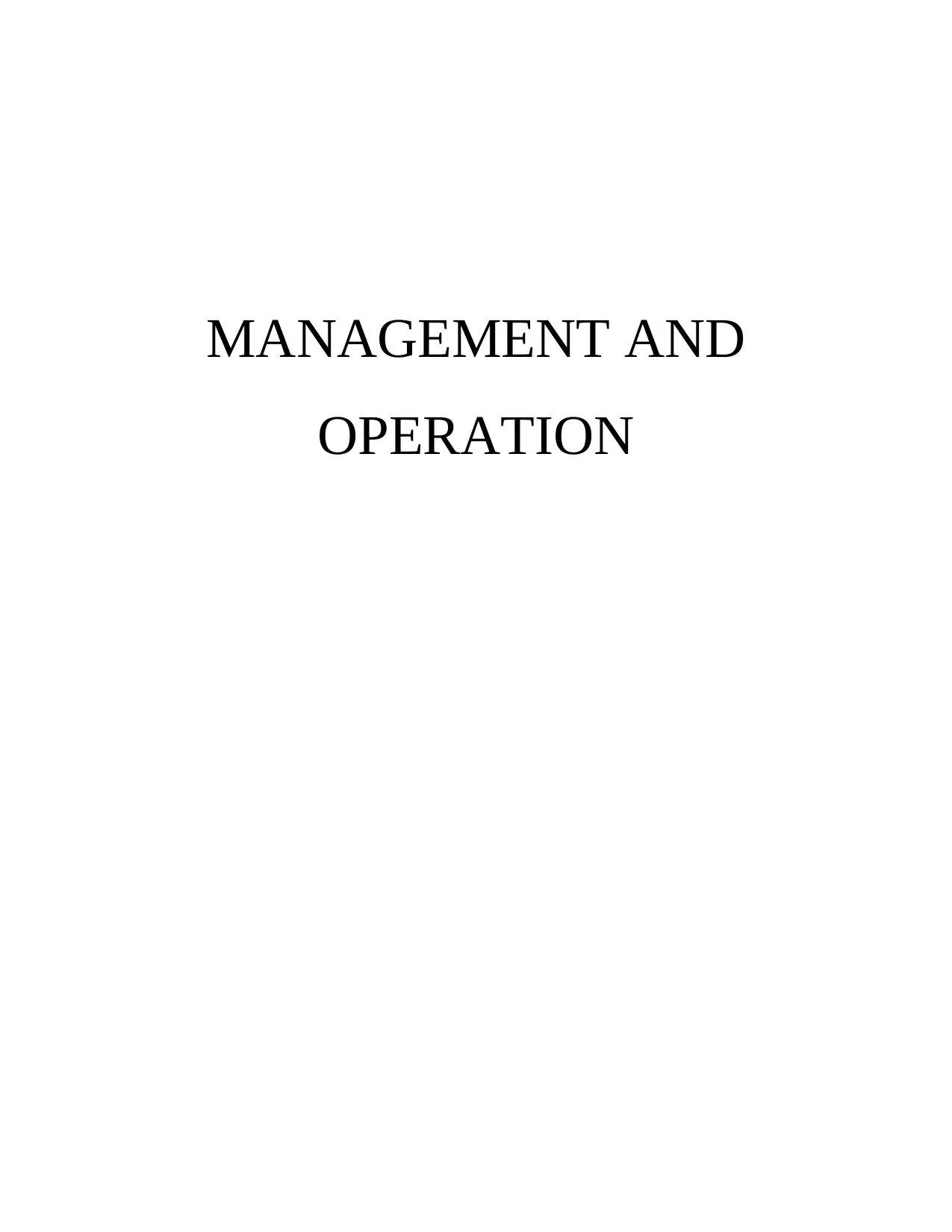
MANAGEMENT AND
OPERATION
OPERATION
Secure Best Marks with AI Grader
Need help grading? Try our AI Grader for instant feedback on your assignments.
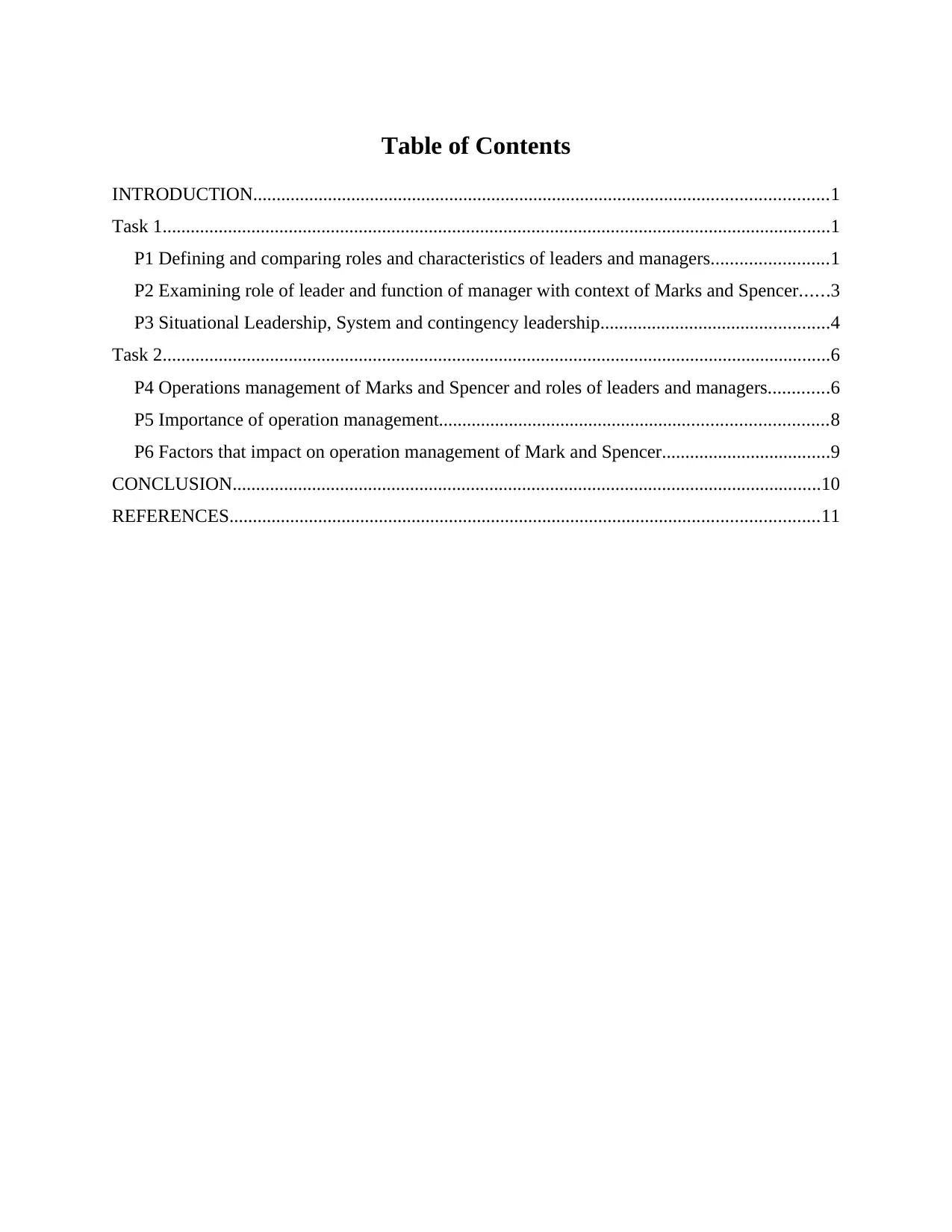
Table of Contents
INTRODUCTION...........................................................................................................................1
Task 1...............................................................................................................................................1
P1 Defining and comparing roles and characteristics of leaders and managers.........................1
P2 Examining role of leader and function of manager with context of Marks and Spencer......3
P3 Situational Leadership, System and contingency leadership.................................................4
Task 2...............................................................................................................................................6
P4 Operations management of Marks and Spencer and roles of leaders and managers.............6
P5 Importance of operation management...................................................................................8
P6 Factors that impact on operation management of Mark and Spencer....................................9
CONCLUSION..............................................................................................................................10
REFERENCES..............................................................................................................................11
INTRODUCTION...........................................................................................................................1
Task 1...............................................................................................................................................1
P1 Defining and comparing roles and characteristics of leaders and managers.........................1
P2 Examining role of leader and function of manager with context of Marks and Spencer......3
P3 Situational Leadership, System and contingency leadership.................................................4
Task 2...............................................................................................................................................6
P4 Operations management of Marks and Spencer and roles of leaders and managers.............6
P5 Importance of operation management...................................................................................8
P6 Factors that impact on operation management of Mark and Spencer....................................9
CONCLUSION..............................................................................................................................10
REFERENCES..............................................................................................................................11
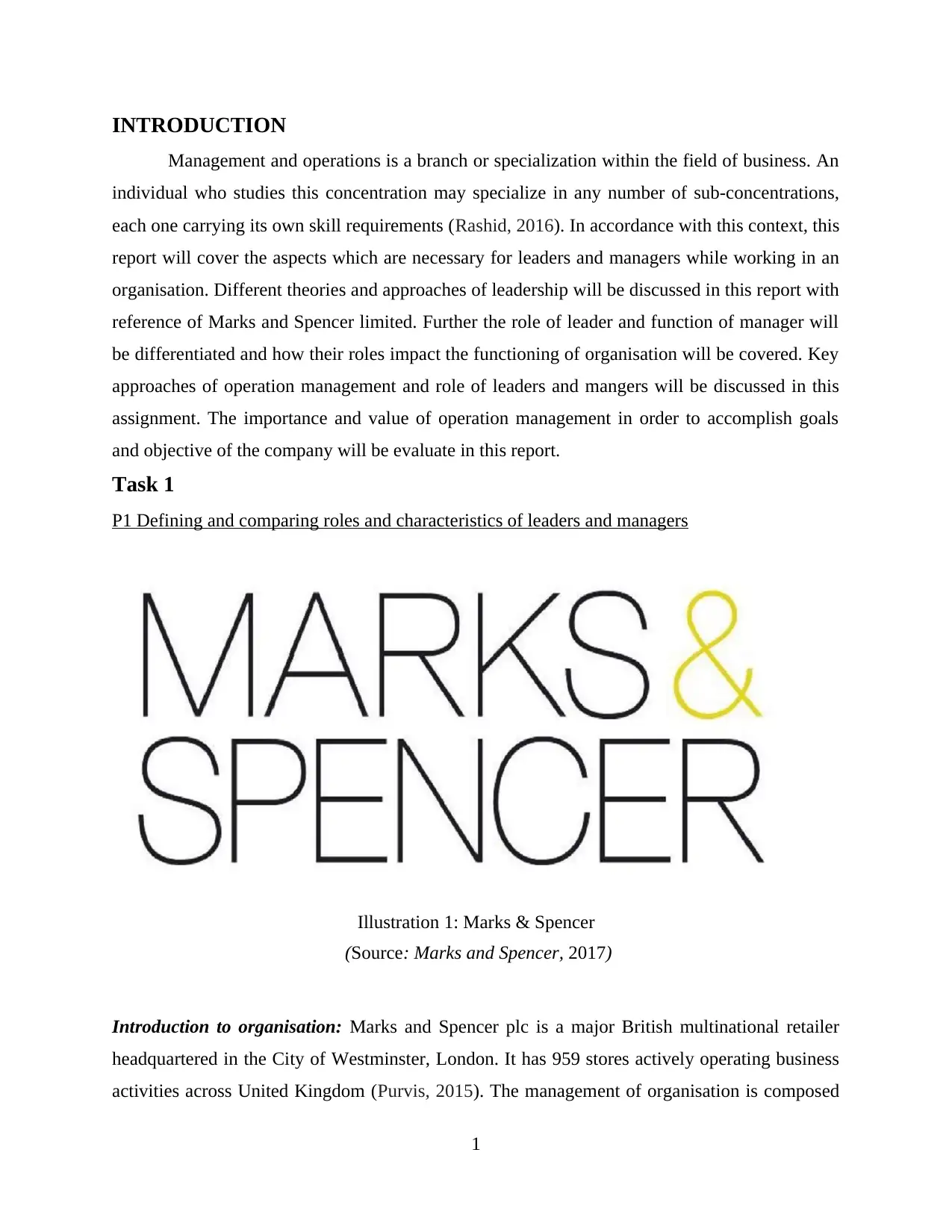
INTRODUCTION
Management and operations is a branch or specialization within the field of business. An
individual who studies this concentration may specialize in any number of sub-concentrations,
each one carrying its own skill requirements (Rashid, 2016). In accordance with this context, this
report will cover the aspects which are necessary for leaders and managers while working in an
organisation. Different theories and approaches of leadership will be discussed in this report with
reference of Marks and Spencer limited. Further the role of leader and function of manager will
be differentiated and how their roles impact the functioning of organisation will be covered. Key
approaches of operation management and role of leaders and mangers will be discussed in this
assignment. The importance and value of operation management in order to accomplish goals
and objective of the company will be evaluate in this report.
Task 1
P1 Defining and comparing roles and characteristics of leaders and managers
Introduction to organisation: Marks and Spencer plc is a major British multinational retailer
headquartered in the City of Westminster, London. It has 959 stores actively operating business
activities across United Kingdom (Purvis, 2015). The management of organisation is composed
1
Illustration 1: Marks & Spencer
(Source: Marks and Spencer, 2017)
Management and operations is a branch or specialization within the field of business. An
individual who studies this concentration may specialize in any number of sub-concentrations,
each one carrying its own skill requirements (Rashid, 2016). In accordance with this context, this
report will cover the aspects which are necessary for leaders and managers while working in an
organisation. Different theories and approaches of leadership will be discussed in this report with
reference of Marks and Spencer limited. Further the role of leader and function of manager will
be differentiated and how their roles impact the functioning of organisation will be covered. Key
approaches of operation management and role of leaders and mangers will be discussed in this
assignment. The importance and value of operation management in order to accomplish goals
and objective of the company will be evaluate in this report.
Task 1
P1 Defining and comparing roles and characteristics of leaders and managers
Introduction to organisation: Marks and Spencer plc is a major British multinational retailer
headquartered in the City of Westminster, London. It has 959 stores actively operating business
activities across United Kingdom (Purvis, 2015). The management of organisation is composed
1
Illustration 1: Marks & Spencer
(Source: Marks and Spencer, 2017)
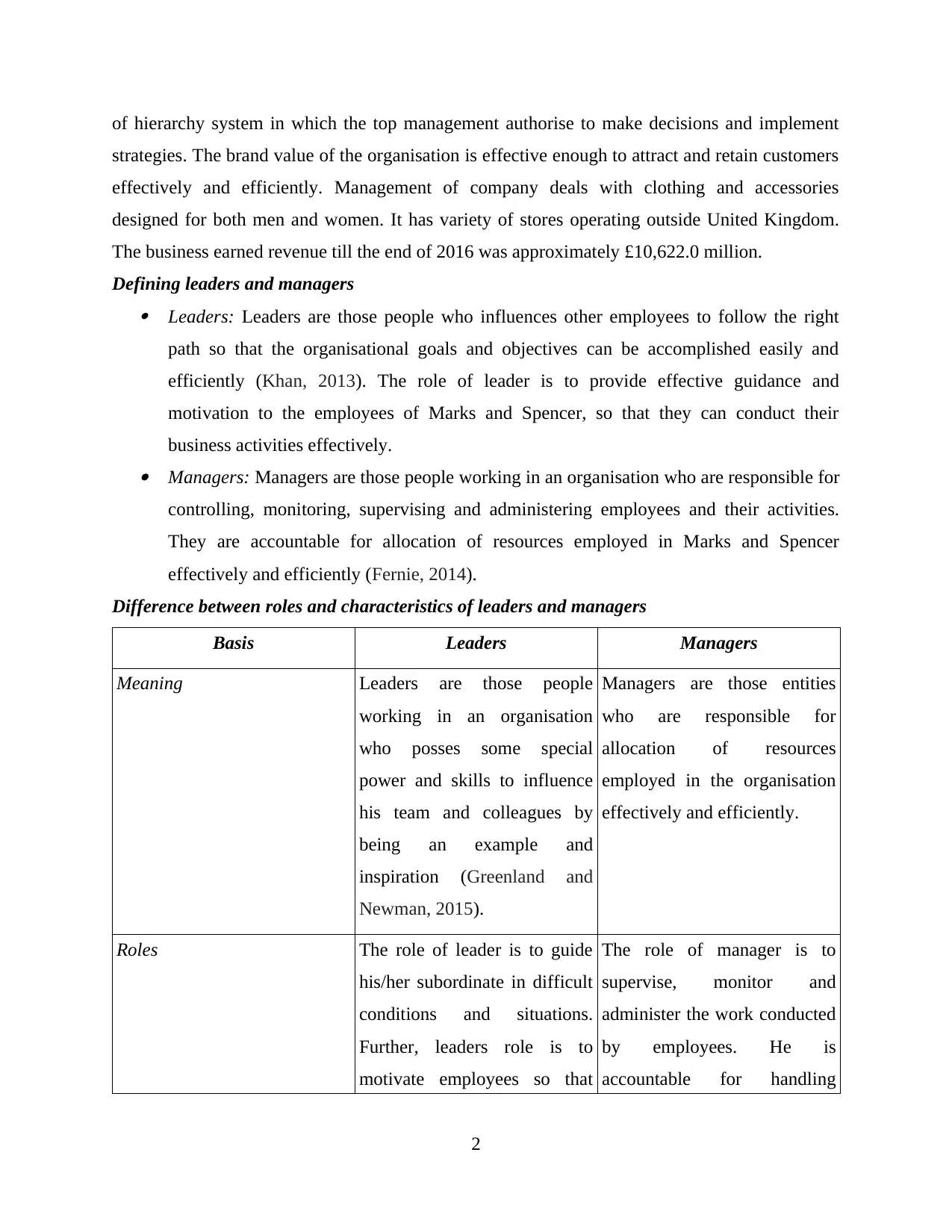
of hierarchy system in which the top management authorise to make decisions and implement
strategies. The brand value of the organisation is effective enough to attract and retain customers
effectively and efficiently. Management of company deals with clothing and accessories
designed for both men and women. It has variety of stores operating outside United Kingdom.
The business earned revenue till the end of 2016 was approximately £10,622.0 million.
Defining leaders and managers Leaders: Leaders are those people who influences other employees to follow the right
path so that the organisational goals and objectives can be accomplished easily and
efficiently (Khan, 2013). The role of leader is to provide effective guidance and
motivation to the employees of Marks and Spencer, so that they can conduct their
business activities effectively. Managers: Managers are those people working in an organisation who are responsible for
controlling, monitoring, supervising and administering employees and their activities.
They are accountable for allocation of resources employed in Marks and Spencer
effectively and efficiently (Fernie, 2014).
Difference between roles and characteristics of leaders and managers
Basis Leaders Managers
Meaning Leaders are those people
working in an organisation
who posses some special
power and skills to influence
his team and colleagues by
being an example and
inspiration (Greenland and
Newman, 2015).
Managers are those entities
who are responsible for
allocation of resources
employed in the organisation
effectively and efficiently.
Roles The role of leader is to guide
his/her subordinate in difficult
conditions and situations.
Further, leaders role is to
motivate employees so that
The role of manager is to
supervise, monitor and
administer the work conducted
by employees. He is
accountable for handling
2
strategies. The brand value of the organisation is effective enough to attract and retain customers
effectively and efficiently. Management of company deals with clothing and accessories
designed for both men and women. It has variety of stores operating outside United Kingdom.
The business earned revenue till the end of 2016 was approximately £10,622.0 million.
Defining leaders and managers Leaders: Leaders are those people who influences other employees to follow the right
path so that the organisational goals and objectives can be accomplished easily and
efficiently (Khan, 2013). The role of leader is to provide effective guidance and
motivation to the employees of Marks and Spencer, so that they can conduct their
business activities effectively. Managers: Managers are those people working in an organisation who are responsible for
controlling, monitoring, supervising and administering employees and their activities.
They are accountable for allocation of resources employed in Marks and Spencer
effectively and efficiently (Fernie, 2014).
Difference between roles and characteristics of leaders and managers
Basis Leaders Managers
Meaning Leaders are those people
working in an organisation
who posses some special
power and skills to influence
his team and colleagues by
being an example and
inspiration (Greenland and
Newman, 2015).
Managers are those entities
who are responsible for
allocation of resources
employed in the organisation
effectively and efficiently.
Roles The role of leader is to guide
his/her subordinate in difficult
conditions and situations.
Further, leaders role is to
motivate employees so that
The role of manager is to
supervise, monitor and
administer the work conducted
by employees. He is
accountable for handling
2
Secure Best Marks with AI Grader
Need help grading? Try our AI Grader for instant feedback on your assignments.
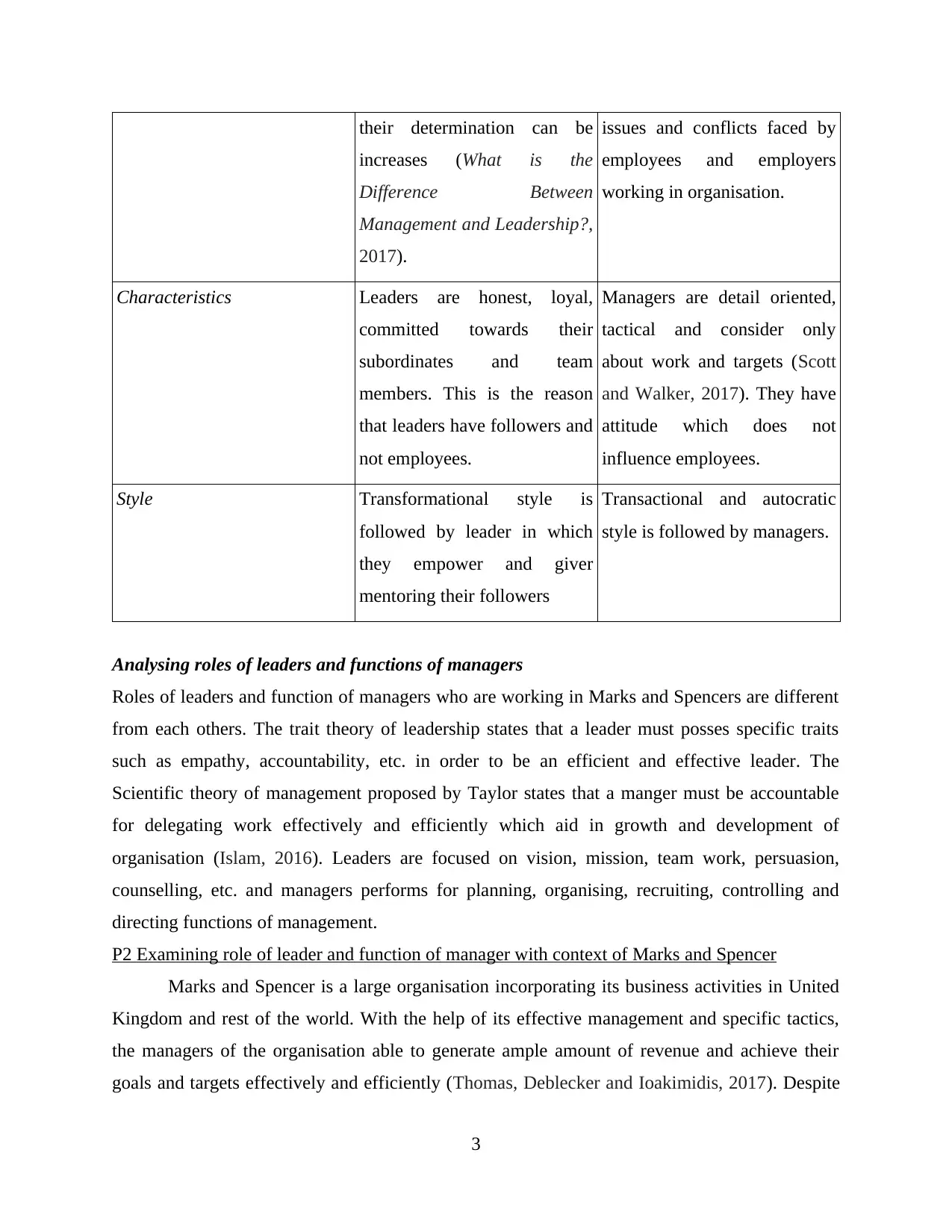
their determination can be
increases (What is the
Difference Between
Management and Leadership?,
2017).
issues and conflicts faced by
employees and employers
working in organisation.
Characteristics Leaders are honest, loyal,
committed towards their
subordinates and team
members. This is the reason
that leaders have followers and
not employees.
Managers are detail oriented,
tactical and consider only
about work and targets (Scott
and Walker, 2017). They have
attitude which does not
influence employees.
Style Transformational style is
followed by leader in which
they empower and giver
mentoring their followers
Transactional and autocratic
style is followed by managers.
Analysing roles of leaders and functions of managers
Roles of leaders and function of managers who are working in Marks and Spencers are different
from each others. The trait theory of leadership states that a leader must posses specific traits
such as empathy, accountability, etc. in order to be an efficient and effective leader. The
Scientific theory of management proposed by Taylor states that a manger must be accountable
for delegating work effectively and efficiently which aid in growth and development of
organisation (Islam, 2016). Leaders are focused on vision, mission, team work, persuasion,
counselling, etc. and managers performs for planning, organising, recruiting, controlling and
directing functions of management.
P2 Examining role of leader and function of manager with context of Marks and Spencer
Marks and Spencer is a large organisation incorporating its business activities in United
Kingdom and rest of the world. With the help of its effective management and specific tactics,
the managers of the organisation able to generate ample amount of revenue and achieve their
goals and targets effectively and efficiently (Thomas, Deblecker and Ioakimidis, 2017). Despite
3
increases (What is the
Difference Between
Management and Leadership?,
2017).
issues and conflicts faced by
employees and employers
working in organisation.
Characteristics Leaders are honest, loyal,
committed towards their
subordinates and team
members. This is the reason
that leaders have followers and
not employees.
Managers are detail oriented,
tactical and consider only
about work and targets (Scott
and Walker, 2017). They have
attitude which does not
influence employees.
Style Transformational style is
followed by leader in which
they empower and giver
mentoring their followers
Transactional and autocratic
style is followed by managers.
Analysing roles of leaders and functions of managers
Roles of leaders and function of managers who are working in Marks and Spencers are different
from each others. The trait theory of leadership states that a leader must posses specific traits
such as empathy, accountability, etc. in order to be an efficient and effective leader. The
Scientific theory of management proposed by Taylor states that a manger must be accountable
for delegating work effectively and efficiently which aid in growth and development of
organisation (Islam, 2016). Leaders are focused on vision, mission, team work, persuasion,
counselling, etc. and managers performs for planning, organising, recruiting, controlling and
directing functions of management.
P2 Examining role of leader and function of manager with context of Marks and Spencer
Marks and Spencer is a large organisation incorporating its business activities in United
Kingdom and rest of the world. With the help of its effective management and specific tactics,
the managers of the organisation able to generate ample amount of revenue and achieve their
goals and targets effectively and efficiently (Thomas, Deblecker and Ioakimidis, 2017). Despite
3
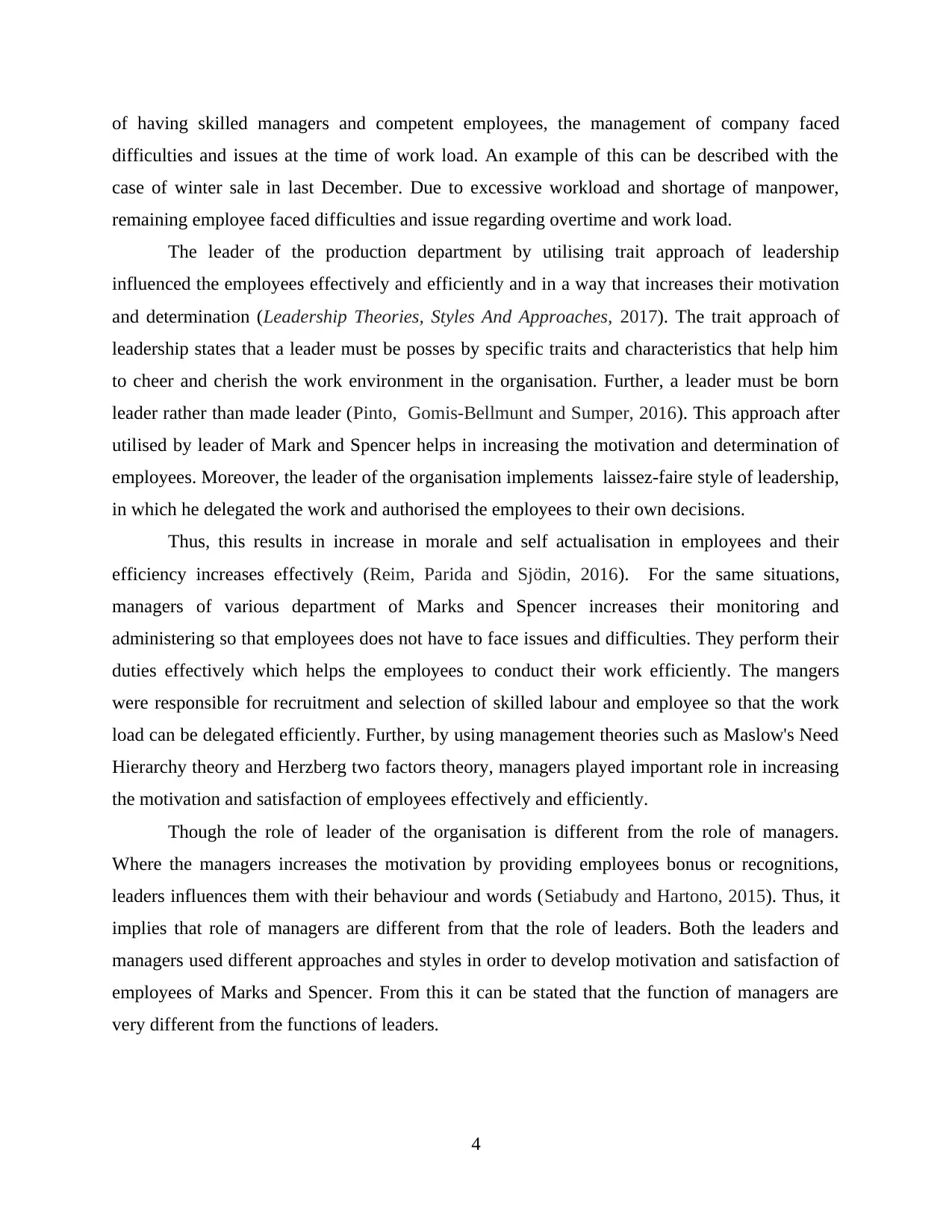
of having skilled managers and competent employees, the management of company faced
difficulties and issues at the time of work load. An example of this can be described with the
case of winter sale in last December. Due to excessive workload and shortage of manpower,
remaining employee faced difficulties and issue regarding overtime and work load.
The leader of the production department by utilising trait approach of leadership
influenced the employees effectively and efficiently and in a way that increases their motivation
and determination (Leadership Theories, Styles And Approaches, 2017). The trait approach of
leadership states that a leader must be posses by specific traits and characteristics that help him
to cheer and cherish the work environment in the organisation. Further, a leader must be born
leader rather than made leader (Pinto, Gomis-Bellmunt and Sumper, 2016). This approach after
utilised by leader of Mark and Spencer helps in increasing the motivation and determination of
employees. Moreover, the leader of the organisation implements laissez-faire style of leadership,
in which he delegated the work and authorised the employees to their own decisions.
Thus, this results in increase in morale and self actualisation in employees and their
efficiency increases effectively (Reim, Parida and Sjödin, 2016). For the same situations,
managers of various department of Marks and Spencer increases their monitoring and
administering so that employees does not have to face issues and difficulties. They perform their
duties effectively which helps the employees to conduct their work efficiently. The mangers
were responsible for recruitment and selection of skilled labour and employee so that the work
load can be delegated efficiently. Further, by using management theories such as Maslow's Need
Hierarchy theory and Herzberg two factors theory, managers played important role in increasing
the motivation and satisfaction of employees effectively and efficiently.
Though the role of leader of the organisation is different from the role of managers.
Where the managers increases the motivation by providing employees bonus or recognitions,
leaders influences them with their behaviour and words (Setiabudy and Hartono, 2015). Thus, it
implies that role of managers are different from that the role of leaders. Both the leaders and
managers used different approaches and styles in order to develop motivation and satisfaction of
employees of Marks and Spencer. From this it can be stated that the function of managers are
very different from the functions of leaders.
4
difficulties and issues at the time of work load. An example of this can be described with the
case of winter sale in last December. Due to excessive workload and shortage of manpower,
remaining employee faced difficulties and issue regarding overtime and work load.
The leader of the production department by utilising trait approach of leadership
influenced the employees effectively and efficiently and in a way that increases their motivation
and determination (Leadership Theories, Styles And Approaches, 2017). The trait approach of
leadership states that a leader must be posses by specific traits and characteristics that help him
to cheer and cherish the work environment in the organisation. Further, a leader must be born
leader rather than made leader (Pinto, Gomis-Bellmunt and Sumper, 2016). This approach after
utilised by leader of Mark and Spencer helps in increasing the motivation and determination of
employees. Moreover, the leader of the organisation implements laissez-faire style of leadership,
in which he delegated the work and authorised the employees to their own decisions.
Thus, this results in increase in morale and self actualisation in employees and their
efficiency increases effectively (Reim, Parida and Sjödin, 2016). For the same situations,
managers of various department of Marks and Spencer increases their monitoring and
administering so that employees does not have to face issues and difficulties. They perform their
duties effectively which helps the employees to conduct their work efficiently. The mangers
were responsible for recruitment and selection of skilled labour and employee so that the work
load can be delegated efficiently. Further, by using management theories such as Maslow's Need
Hierarchy theory and Herzberg two factors theory, managers played important role in increasing
the motivation and satisfaction of employees effectively and efficiently.
Though the role of leader of the organisation is different from the role of managers.
Where the managers increases the motivation by providing employees bonus or recognitions,
leaders influences them with their behaviour and words (Setiabudy and Hartono, 2015). Thus, it
implies that role of managers are different from that the role of leaders. Both the leaders and
managers used different approaches and styles in order to develop motivation and satisfaction of
employees of Marks and Spencer. From this it can be stated that the function of managers are
very different from the functions of leaders.
4
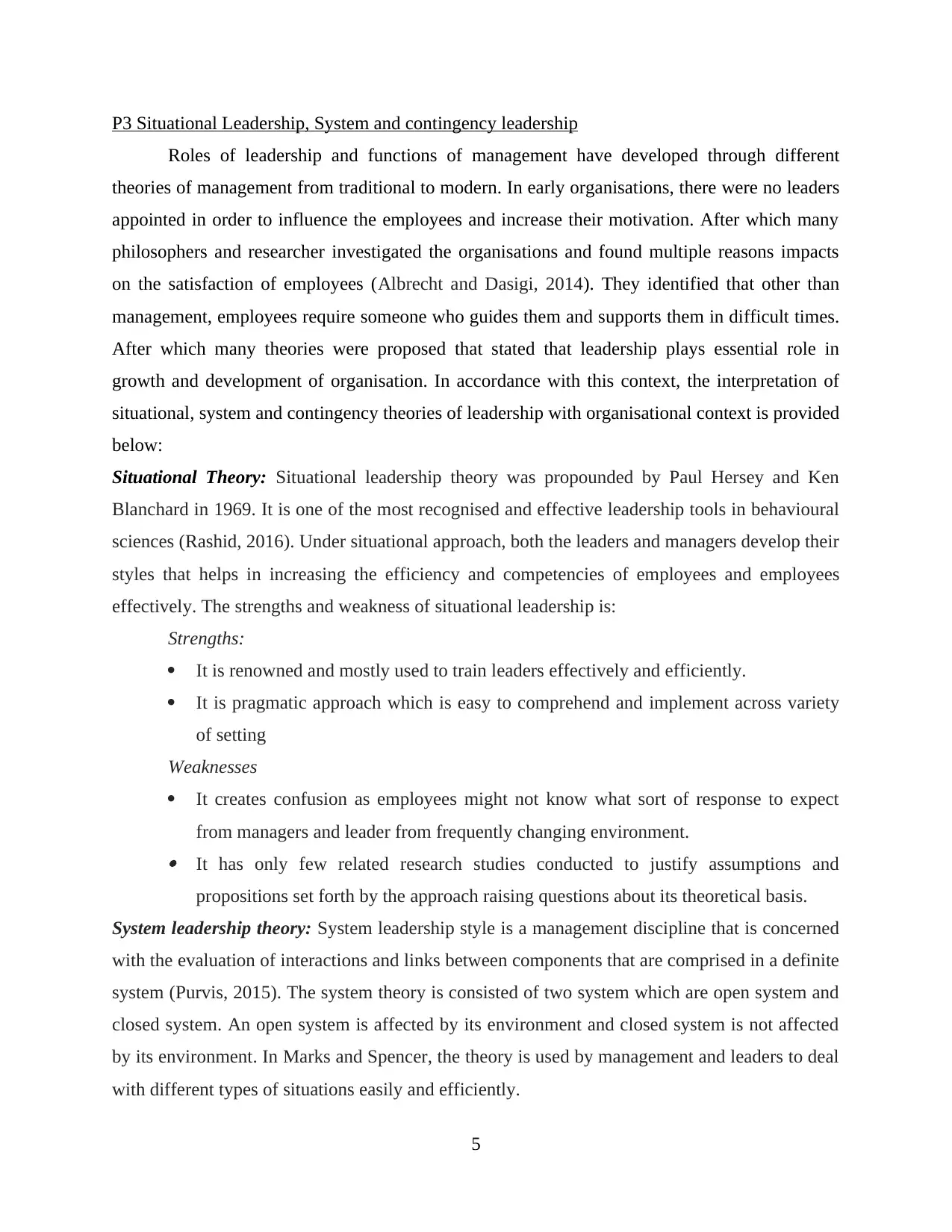
P3 Situational Leadership, System and contingency leadership
Roles of leadership and functions of management have developed through different
theories of management from traditional to modern. In early organisations, there were no leaders
appointed in order to influence the employees and increase their motivation. After which many
philosophers and researcher investigated the organisations and found multiple reasons impacts
on the satisfaction of employees (Albrecht and Dasigi, 2014). They identified that other than
management, employees require someone who guides them and supports them in difficult times.
After which many theories were proposed that stated that leadership plays essential role in
growth and development of organisation. In accordance with this context, the interpretation of
situational, system and contingency theories of leadership with organisational context is provided
below:
Situational Theory: Situational leadership theory was propounded by Paul Hersey and Ken
Blanchard in 1969. It is one of the most recognised and effective leadership tools in behavioural
sciences (Rashid, 2016). Under situational approach, both the leaders and managers develop their
styles that helps in increasing the efficiency and competencies of employees and employees
effectively. The strengths and weakness of situational leadership is:
Strengths:
It is renowned and mostly used to train leaders effectively and efficiently.
It is pragmatic approach which is easy to comprehend and implement across variety
of setting
Weaknesses
It creates confusion as employees might not know what sort of response to expect
from managers and leader from frequently changing environment.
It has only few related research studies conducted to justify assumptions and
propositions set forth by the approach raising questions about its theoretical basis.
System leadership theory: System leadership style is a management discipline that is concerned
with the evaluation of interactions and links between components that are comprised in a definite
system (Purvis, 2015). The system theory is consisted of two system which are open system and
closed system. An open system is affected by its environment and closed system is not affected
by its environment. In Marks and Spencer, the theory is used by management and leaders to deal
with different types of situations easily and efficiently.
5
Roles of leadership and functions of management have developed through different
theories of management from traditional to modern. In early organisations, there were no leaders
appointed in order to influence the employees and increase their motivation. After which many
philosophers and researcher investigated the organisations and found multiple reasons impacts
on the satisfaction of employees (Albrecht and Dasigi, 2014). They identified that other than
management, employees require someone who guides them and supports them in difficult times.
After which many theories were proposed that stated that leadership plays essential role in
growth and development of organisation. In accordance with this context, the interpretation of
situational, system and contingency theories of leadership with organisational context is provided
below:
Situational Theory: Situational leadership theory was propounded by Paul Hersey and Ken
Blanchard in 1969. It is one of the most recognised and effective leadership tools in behavioural
sciences (Rashid, 2016). Under situational approach, both the leaders and managers develop their
styles that helps in increasing the efficiency and competencies of employees and employees
effectively. The strengths and weakness of situational leadership is:
Strengths:
It is renowned and mostly used to train leaders effectively and efficiently.
It is pragmatic approach which is easy to comprehend and implement across variety
of setting
Weaknesses
It creates confusion as employees might not know what sort of response to expect
from managers and leader from frequently changing environment.
It has only few related research studies conducted to justify assumptions and
propositions set forth by the approach raising questions about its theoretical basis.
System leadership theory: System leadership style is a management discipline that is concerned
with the evaluation of interactions and links between components that are comprised in a definite
system (Purvis, 2015). The system theory is consisted of two system which are open system and
closed system. An open system is affected by its environment and closed system is not affected
by its environment. In Marks and Spencer, the theory is used by management and leaders to deal
with different types of situations easily and efficiently.
5
Paraphrase This Document
Need a fresh take? Get an instant paraphrase of this document with our AI Paraphraser
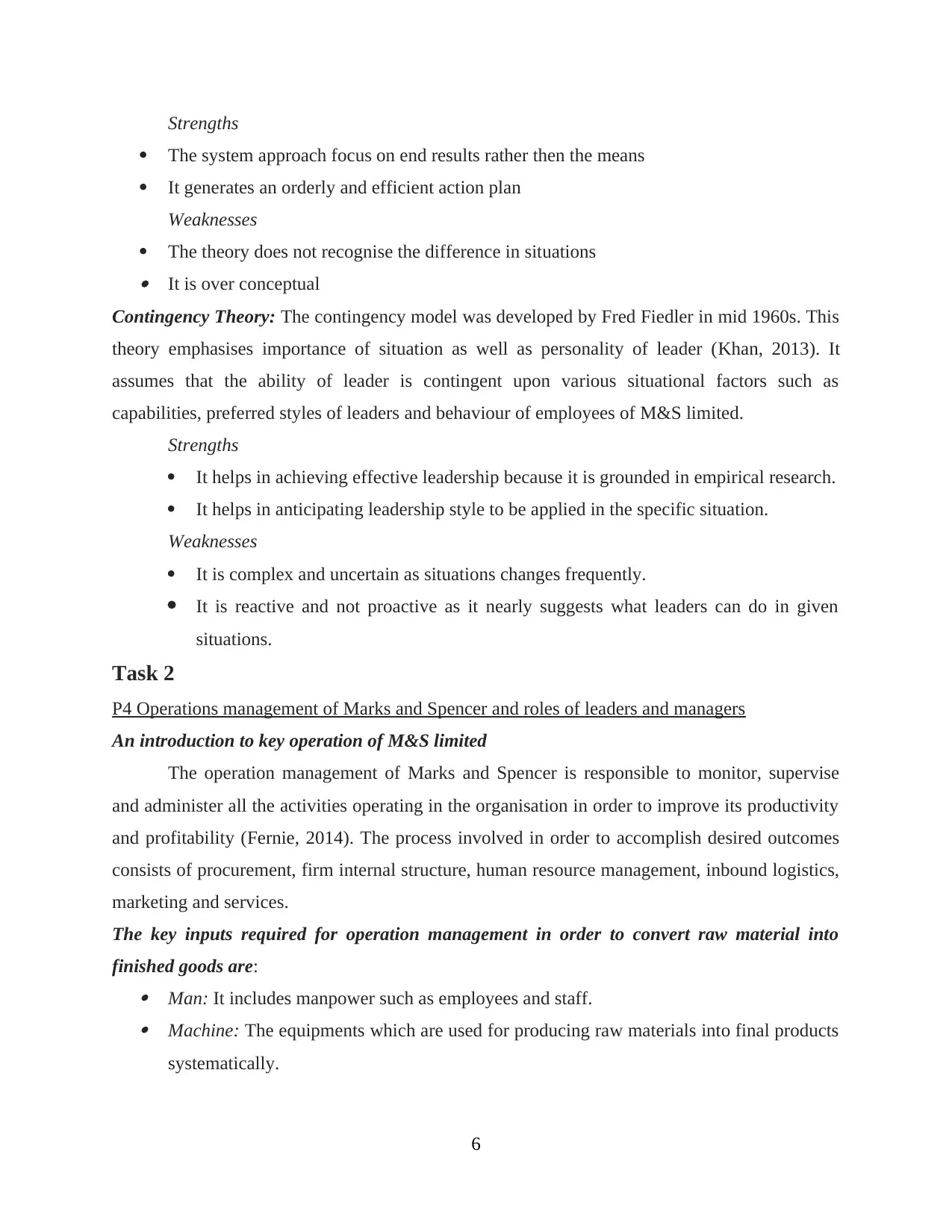
Strengths
The system approach focus on end results rather then the means
It generates an orderly and efficient action plan
Weaknesses
The theory does not recognise the difference in situations It is over conceptual
Contingency Theory: The contingency model was developed by Fred Fiedler in mid 1960s. This
theory emphasises importance of situation as well as personality of leader (Khan, 2013). It
assumes that the ability of leader is contingent upon various situational factors such as
capabilities, preferred styles of leaders and behaviour of employees of M&S limited.
Strengths
It helps in achieving effective leadership because it is grounded in empirical research.
It helps in anticipating leadership style to be applied in the specific situation.
Weaknesses
It is complex and uncertain as situations changes frequently.
It is reactive and not proactive as it nearly suggests what leaders can do in given
situations.
Task 2
P4 Operations management of Marks and Spencer and roles of leaders and managers
An introduction to key operation of M&S limited
The operation management of Marks and Spencer is responsible to monitor, supervise
and administer all the activities operating in the organisation in order to improve its productivity
and profitability (Fernie, 2014). The process involved in order to accomplish desired outcomes
consists of procurement, firm internal structure, human resource management, inbound logistics,
marketing and services.
The key inputs required for operation management in order to convert raw material into
finished goods are: Man: It includes manpower such as employees and staff. Machine: The equipments which are used for producing raw materials into final products
systematically.
6
The system approach focus on end results rather then the means
It generates an orderly and efficient action plan
Weaknesses
The theory does not recognise the difference in situations It is over conceptual
Contingency Theory: The contingency model was developed by Fred Fiedler in mid 1960s. This
theory emphasises importance of situation as well as personality of leader (Khan, 2013). It
assumes that the ability of leader is contingent upon various situational factors such as
capabilities, preferred styles of leaders and behaviour of employees of M&S limited.
Strengths
It helps in achieving effective leadership because it is grounded in empirical research.
It helps in anticipating leadership style to be applied in the specific situation.
Weaknesses
It is complex and uncertain as situations changes frequently.
It is reactive and not proactive as it nearly suggests what leaders can do in given
situations.
Task 2
P4 Operations management of Marks and Spencer and roles of leaders and managers
An introduction to key operation of M&S limited
The operation management of Marks and Spencer is responsible to monitor, supervise
and administer all the activities operating in the organisation in order to improve its productivity
and profitability (Fernie, 2014). The process involved in order to accomplish desired outcomes
consists of procurement, firm internal structure, human resource management, inbound logistics,
marketing and services.
The key inputs required for operation management in order to convert raw material into
finished goods are: Man: It includes manpower such as employees and staff. Machine: The equipments which are used for producing raw materials into final products
systematically.
6
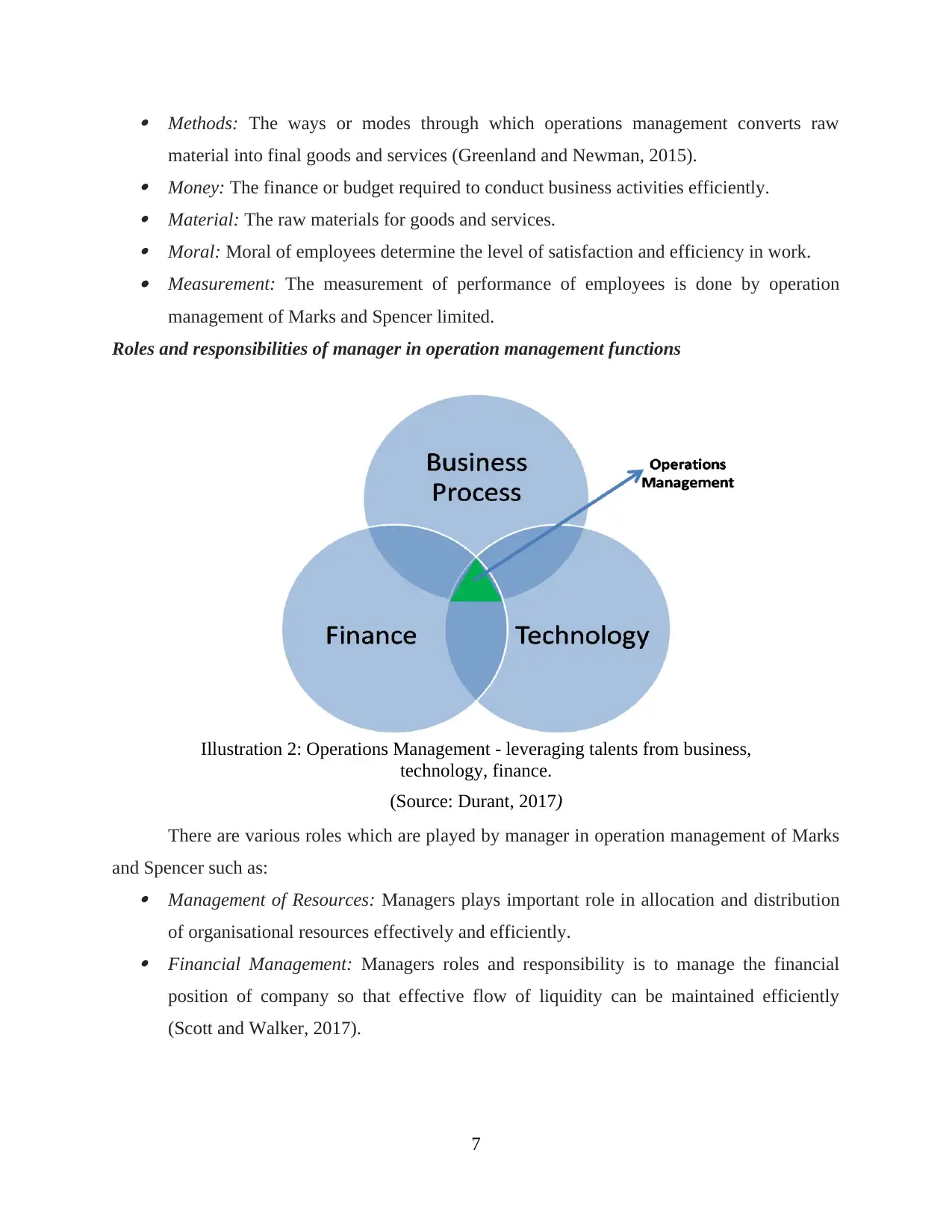
Methods: The ways or modes through which operations management converts raw
material into final goods and services (Greenland and Newman, 2015). Money: The finance or budget required to conduct business activities efficiently. Material: The raw materials for goods and services. Moral: Moral of employees determine the level of satisfaction and efficiency in work. Measurement: The measurement of performance of employees is done by operation
management of Marks and Spencer limited.
Roles and responsibilities of manager in operation management functions
There are various roles which are played by manager in operation management of Marks
and Spencer such as: Management of Resources: Managers plays important role in allocation and distribution
of organisational resources effectively and efficiently. Financial Management: Managers roles and responsibility is to manage the financial
position of company so that effective flow of liquidity can be maintained efficiently
(Scott and Walker, 2017).
7
Illustration 2: Operations Management - leveraging talents from business,
technology, finance.
(Source: Durant, 2017)
material into final goods and services (Greenland and Newman, 2015). Money: The finance or budget required to conduct business activities efficiently. Material: The raw materials for goods and services. Moral: Moral of employees determine the level of satisfaction and efficiency in work. Measurement: The measurement of performance of employees is done by operation
management of Marks and Spencer limited.
Roles and responsibilities of manager in operation management functions
There are various roles which are played by manager in operation management of Marks
and Spencer such as: Management of Resources: Managers plays important role in allocation and distribution
of organisational resources effectively and efficiently. Financial Management: Managers roles and responsibility is to manage the financial
position of company so that effective flow of liquidity can be maintained efficiently
(Scott and Walker, 2017).
7
Illustration 2: Operations Management - leveraging talents from business,
technology, finance.
(Source: Durant, 2017)
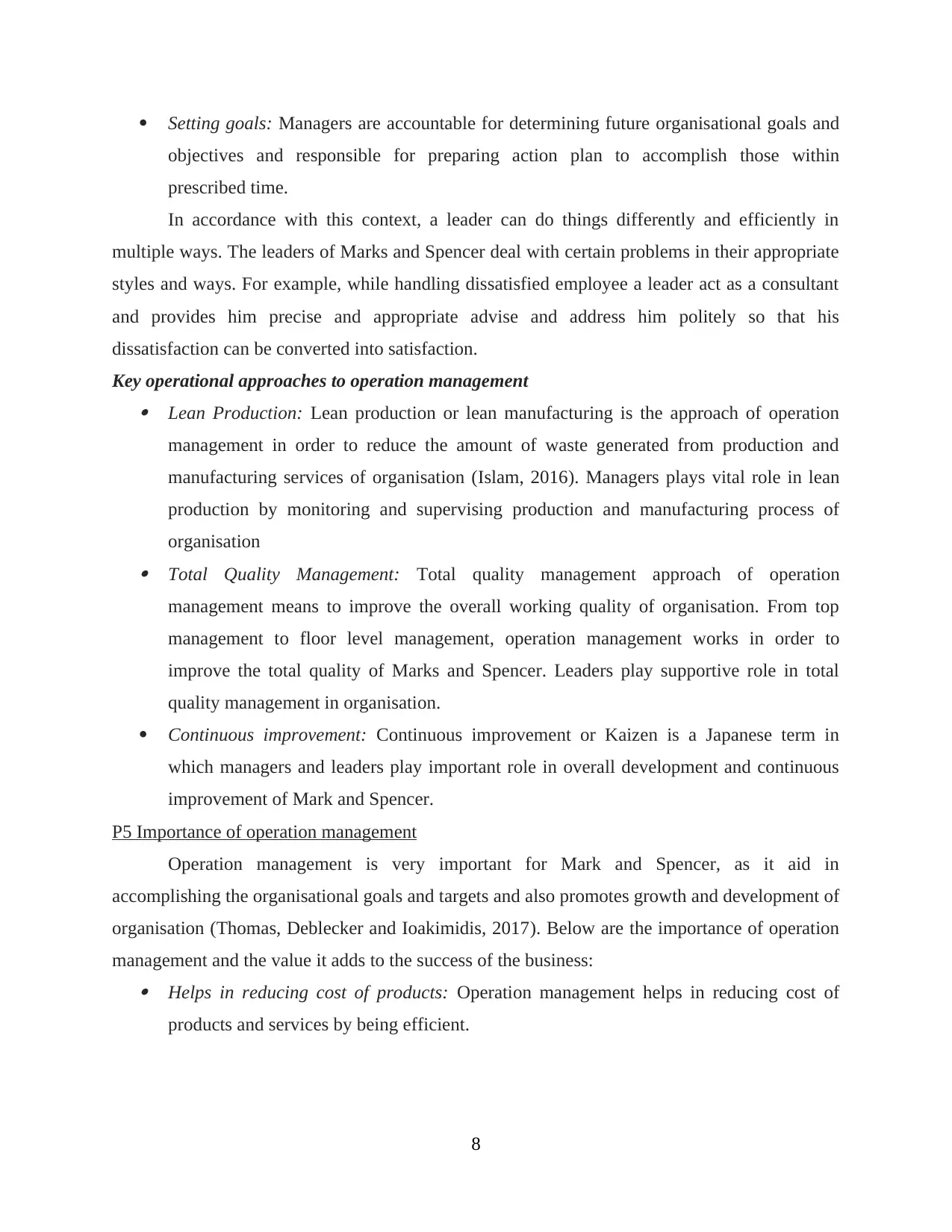
Setting goals: Managers are accountable for determining future organisational goals and
objectives and responsible for preparing action plan to accomplish those within
prescribed time.
In accordance with this context, a leader can do things differently and efficiently in
multiple ways. The leaders of Marks and Spencer deal with certain problems in their appropriate
styles and ways. For example, while handling dissatisfied employee a leader act as a consultant
and provides him precise and appropriate advise and address him politely so that his
dissatisfaction can be converted into satisfaction.
Key operational approaches to operation management Lean Production: Lean production or lean manufacturing is the approach of operation
management in order to reduce the amount of waste generated from production and
manufacturing services of organisation (Islam, 2016). Managers plays vital role in lean
production by monitoring and supervising production and manufacturing process of
organisation Total Quality Management: Total quality management approach of operation
management means to improve the overall working quality of organisation. From top
management to floor level management, operation management works in order to
improve the total quality of Marks and Spencer. Leaders play supportive role in total
quality management in organisation.
Continuous improvement: Continuous improvement or Kaizen is a Japanese term in
which managers and leaders play important role in overall development and continuous
improvement of Mark and Spencer.
P5 Importance of operation management
Operation management is very important for Mark and Spencer, as it aid in
accomplishing the organisational goals and targets and also promotes growth and development of
organisation (Thomas, Deblecker and Ioakimidis, 2017). Below are the importance of operation
management and the value it adds to the success of the business: Helps in reducing cost of products: Operation management helps in reducing cost of
products and services by being efficient.
8
objectives and responsible for preparing action plan to accomplish those within
prescribed time.
In accordance with this context, a leader can do things differently and efficiently in
multiple ways. The leaders of Marks and Spencer deal with certain problems in their appropriate
styles and ways. For example, while handling dissatisfied employee a leader act as a consultant
and provides him precise and appropriate advise and address him politely so that his
dissatisfaction can be converted into satisfaction.
Key operational approaches to operation management Lean Production: Lean production or lean manufacturing is the approach of operation
management in order to reduce the amount of waste generated from production and
manufacturing services of organisation (Islam, 2016). Managers plays vital role in lean
production by monitoring and supervising production and manufacturing process of
organisation Total Quality Management: Total quality management approach of operation
management means to improve the overall working quality of organisation. From top
management to floor level management, operation management works in order to
improve the total quality of Marks and Spencer. Leaders play supportive role in total
quality management in organisation.
Continuous improvement: Continuous improvement or Kaizen is a Japanese term in
which managers and leaders play important role in overall development and continuous
improvement of Mark and Spencer.
P5 Importance of operation management
Operation management is very important for Mark and Spencer, as it aid in
accomplishing the organisational goals and targets and also promotes growth and development of
organisation (Thomas, Deblecker and Ioakimidis, 2017). Below are the importance of operation
management and the value it adds to the success of the business: Helps in reducing cost of products: Operation management helps in reducing cost of
products and services by being efficient.
8
Secure Best Marks with AI Grader
Need help grading? Try our AI Grader for instant feedback on your assignments.
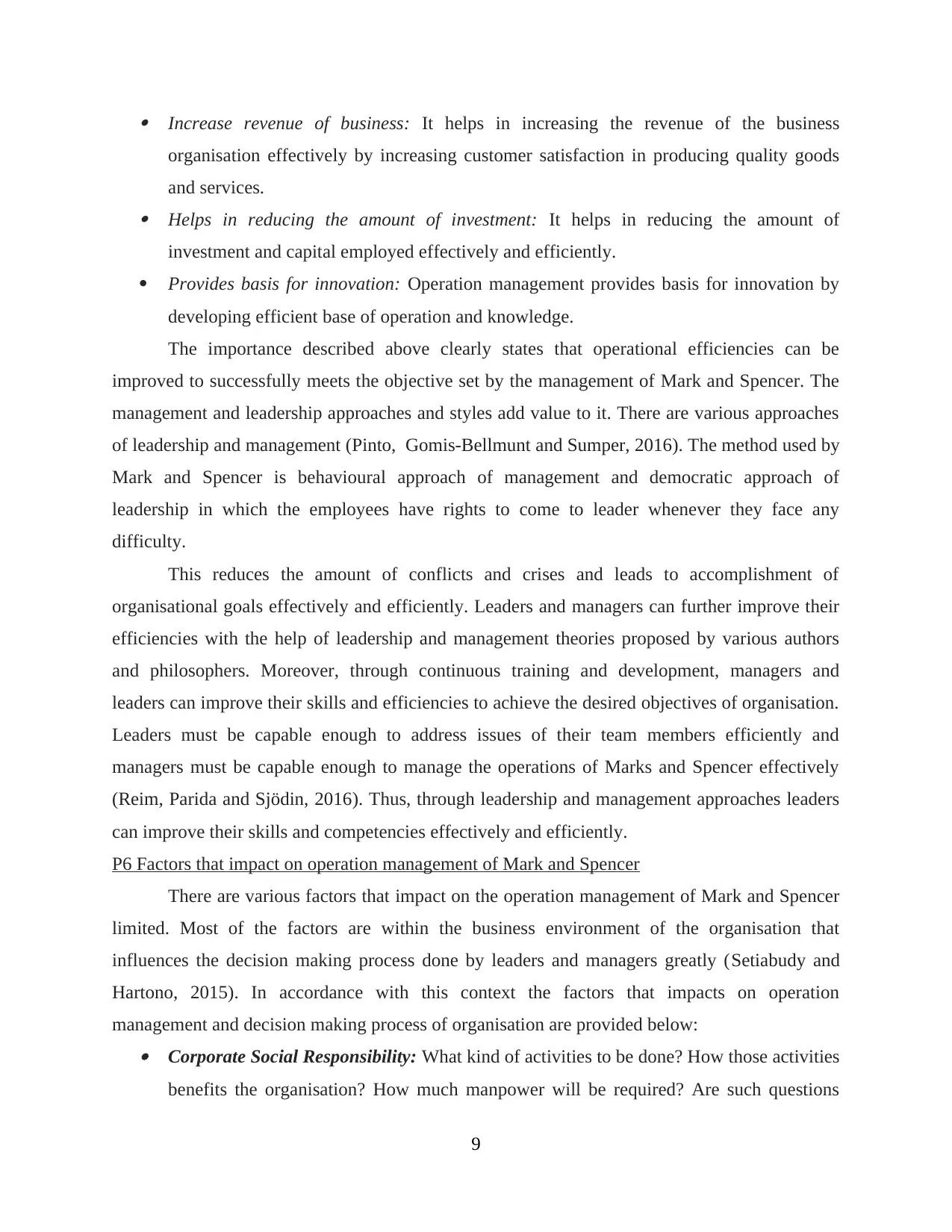
Increase revenue of business: It helps in increasing the revenue of the business
organisation effectively by increasing customer satisfaction in producing quality goods
and services. Helps in reducing the amount of investment: It helps in reducing the amount of
investment and capital employed effectively and efficiently.
Provides basis for innovation: Operation management provides basis for innovation by
developing efficient base of operation and knowledge.
The importance described above clearly states that operational efficiencies can be
improved to successfully meets the objective set by the management of Mark and Spencer. The
management and leadership approaches and styles add value to it. There are various approaches
of leadership and management (Pinto, Gomis-Bellmunt and Sumper, 2016). The method used by
Mark and Spencer is behavioural approach of management and democratic approach of
leadership in which the employees have rights to come to leader whenever they face any
difficulty.
This reduces the amount of conflicts and crises and leads to accomplishment of
organisational goals effectively and efficiently. Leaders and managers can further improve their
efficiencies with the help of leadership and management theories proposed by various authors
and philosophers. Moreover, through continuous training and development, managers and
leaders can improve their skills and efficiencies to achieve the desired objectives of organisation.
Leaders must be capable enough to address issues of their team members efficiently and
managers must be capable enough to manage the operations of Marks and Spencer effectively
(Reim, Parida and Sjödin, 2016). Thus, through leadership and management approaches leaders
can improve their skills and competencies effectively and efficiently.
P6 Factors that impact on operation management of Mark and Spencer
There are various factors that impact on the operation management of Mark and Spencer
limited. Most of the factors are within the business environment of the organisation that
influences the decision making process done by leaders and managers greatly (Setiabudy and
Hartono, 2015). In accordance with this context the factors that impacts on operation
management and decision making process of organisation are provided below: Corporate Social Responsibility: What kind of activities to be done? How those activities
benefits the organisation? How much manpower will be required? Are such questions
9
organisation effectively by increasing customer satisfaction in producing quality goods
and services. Helps in reducing the amount of investment: It helps in reducing the amount of
investment and capital employed effectively and efficiently.
Provides basis for innovation: Operation management provides basis for innovation by
developing efficient base of operation and knowledge.
The importance described above clearly states that operational efficiencies can be
improved to successfully meets the objective set by the management of Mark and Spencer. The
management and leadership approaches and styles add value to it. There are various approaches
of leadership and management (Pinto, Gomis-Bellmunt and Sumper, 2016). The method used by
Mark and Spencer is behavioural approach of management and democratic approach of
leadership in which the employees have rights to come to leader whenever they face any
difficulty.
This reduces the amount of conflicts and crises and leads to accomplishment of
organisational goals effectively and efficiently. Leaders and managers can further improve their
efficiencies with the help of leadership and management theories proposed by various authors
and philosophers. Moreover, through continuous training and development, managers and
leaders can improve their skills and efficiencies to achieve the desired objectives of organisation.
Leaders must be capable enough to address issues of their team members efficiently and
managers must be capable enough to manage the operations of Marks and Spencer effectively
(Reim, Parida and Sjödin, 2016). Thus, through leadership and management approaches leaders
can improve their skills and competencies effectively and efficiently.
P6 Factors that impact on operation management of Mark and Spencer
There are various factors that impact on the operation management of Mark and Spencer
limited. Most of the factors are within the business environment of the organisation that
influences the decision making process done by leaders and managers greatly (Setiabudy and
Hartono, 2015). In accordance with this context the factors that impacts on operation
management and decision making process of organisation are provided below: Corporate Social Responsibility: What kind of activities to be done? How those activities
benefits the organisation? How much manpower will be required? Are such questions
9
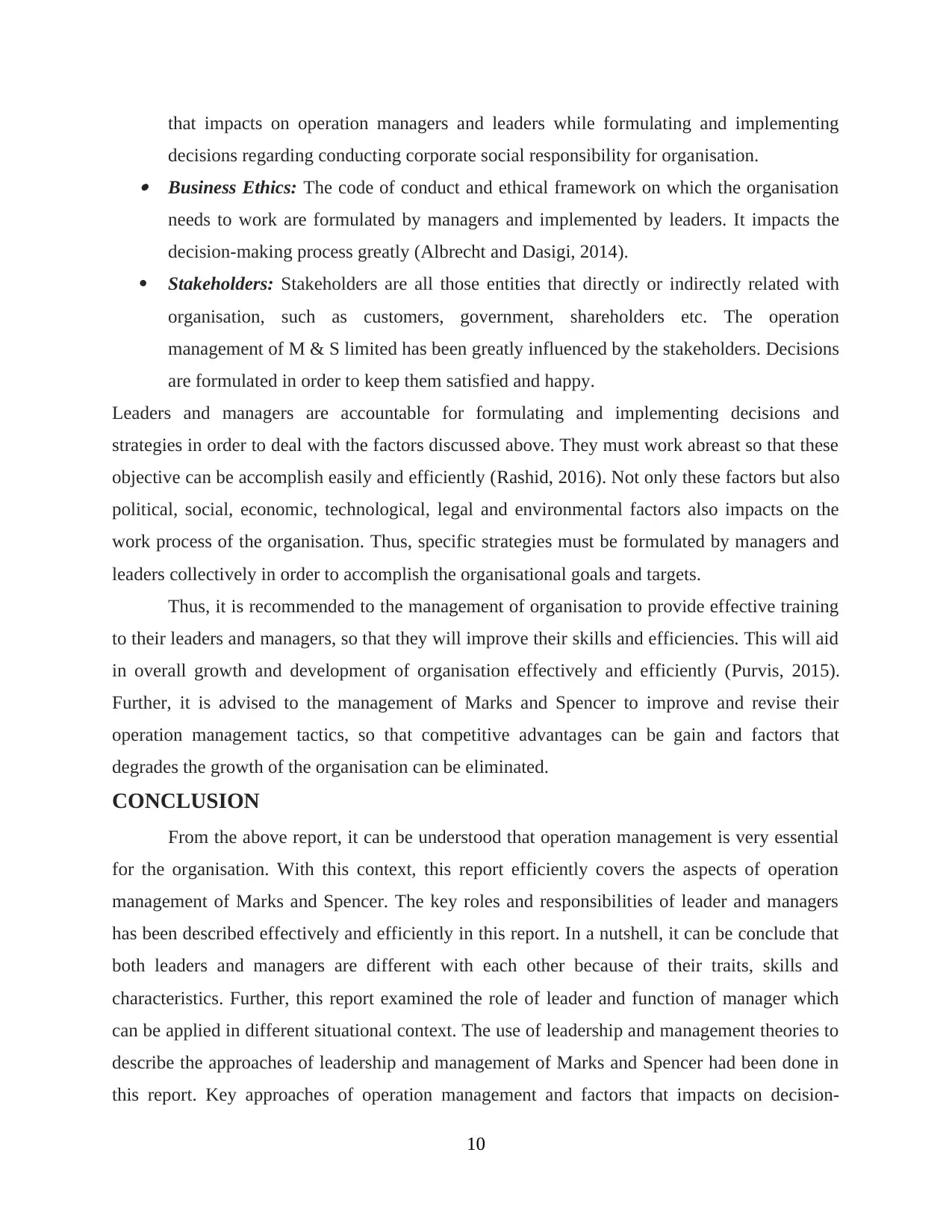
that impacts on operation managers and leaders while formulating and implementing
decisions regarding conducting corporate social responsibility for organisation. Business Ethics: The code of conduct and ethical framework on which the organisation
needs to work are formulated by managers and implemented by leaders. It impacts the
decision-making process greatly (Albrecht and Dasigi, 2014).
Stakeholders: Stakeholders are all those entities that directly or indirectly related with
organisation, such as customers, government, shareholders etc. The operation
management of M & S limited has been greatly influenced by the stakeholders. Decisions
are formulated in order to keep them satisfied and happy.
Leaders and managers are accountable for formulating and implementing decisions and
strategies in order to deal with the factors discussed above. They must work abreast so that these
objective can be accomplish easily and efficiently (Rashid, 2016). Not only these factors but also
political, social, economic, technological, legal and environmental factors also impacts on the
work process of the organisation. Thus, specific strategies must be formulated by managers and
leaders collectively in order to accomplish the organisational goals and targets.
Thus, it is recommended to the management of organisation to provide effective training
to their leaders and managers, so that they will improve their skills and efficiencies. This will aid
in overall growth and development of organisation effectively and efficiently (Purvis, 2015).
Further, it is advised to the management of Marks and Spencer to improve and revise their
operation management tactics, so that competitive advantages can be gain and factors that
degrades the growth of the organisation can be eliminated.
CONCLUSION
From the above report, it can be understood that operation management is very essential
for the organisation. With this context, this report efficiently covers the aspects of operation
management of Marks and Spencer. The key roles and responsibilities of leader and managers
has been described effectively and efficiently in this report. In a nutshell, it can be conclude that
both leaders and managers are different with each other because of their traits, skills and
characteristics. Further, this report examined the role of leader and function of manager which
can be applied in different situational context. The use of leadership and management theories to
describe the approaches of leadership and management of Marks and Spencer had been done in
this report. Key approaches of operation management and factors that impacts on decision-
10
decisions regarding conducting corporate social responsibility for organisation. Business Ethics: The code of conduct and ethical framework on which the organisation
needs to work are formulated by managers and implemented by leaders. It impacts the
decision-making process greatly (Albrecht and Dasigi, 2014).
Stakeholders: Stakeholders are all those entities that directly or indirectly related with
organisation, such as customers, government, shareholders etc. The operation
management of M & S limited has been greatly influenced by the stakeholders. Decisions
are formulated in order to keep them satisfied and happy.
Leaders and managers are accountable for formulating and implementing decisions and
strategies in order to deal with the factors discussed above. They must work abreast so that these
objective can be accomplish easily and efficiently (Rashid, 2016). Not only these factors but also
political, social, economic, technological, legal and environmental factors also impacts on the
work process of the organisation. Thus, specific strategies must be formulated by managers and
leaders collectively in order to accomplish the organisational goals and targets.
Thus, it is recommended to the management of organisation to provide effective training
to their leaders and managers, so that they will improve their skills and efficiencies. This will aid
in overall growth and development of organisation effectively and efficiently (Purvis, 2015).
Further, it is advised to the management of Marks and Spencer to improve and revise their
operation management tactics, so that competitive advantages can be gain and factors that
degrades the growth of the organisation can be eliminated.
CONCLUSION
From the above report, it can be understood that operation management is very essential
for the organisation. With this context, this report efficiently covers the aspects of operation
management of Marks and Spencer. The key roles and responsibilities of leader and managers
has been described effectively and efficiently in this report. In a nutshell, it can be conclude that
both leaders and managers are different with each other because of their traits, skills and
characteristics. Further, this report examined the role of leader and function of manager which
can be applied in different situational context. The use of leadership and management theories to
describe the approaches of leadership and management of Marks and Spencer had been done in
this report. Key approaches of operation management and factors that impacts on decision-
10
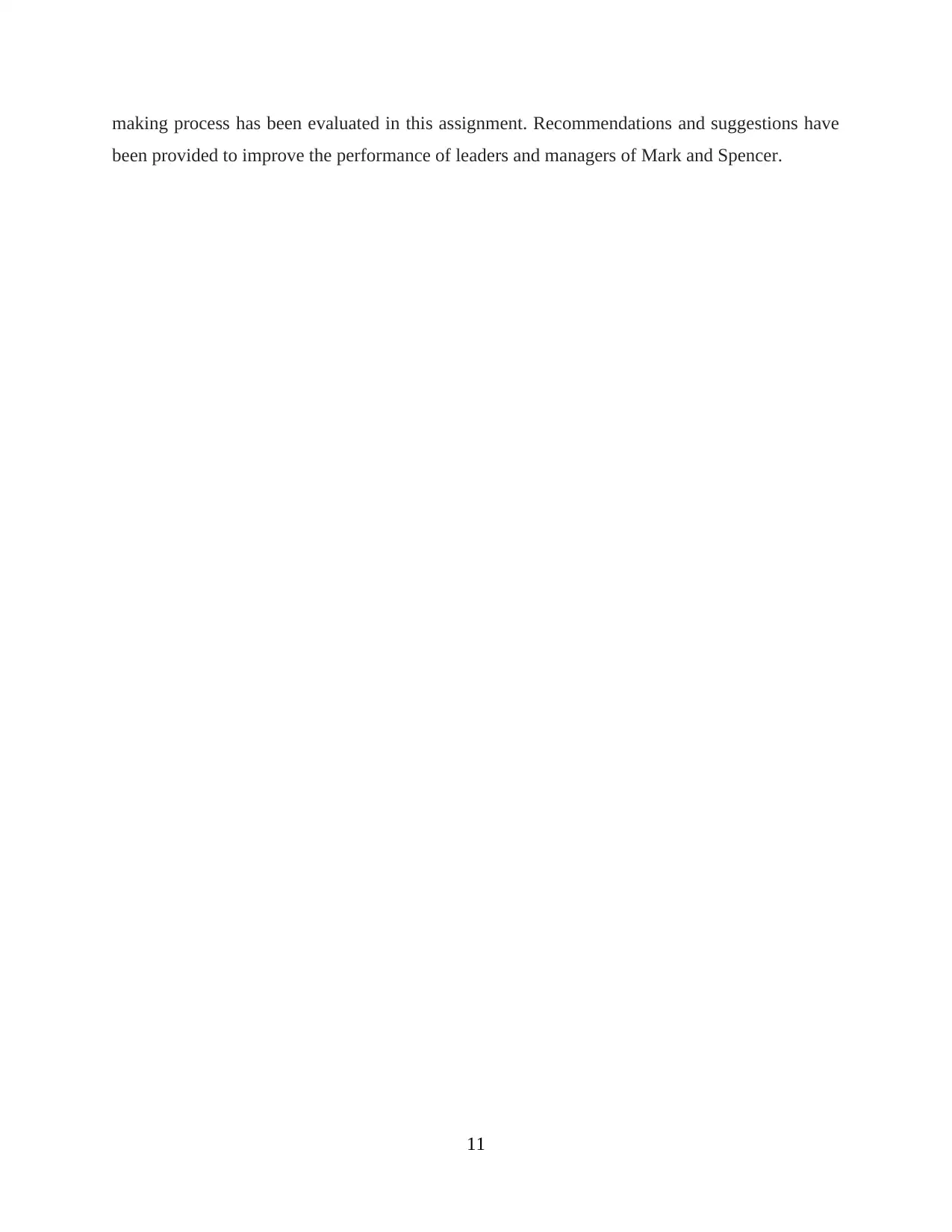
making process has been evaluated in this assignment. Recommendations and suggestions have
been provided to improve the performance of leaders and managers of Mark and Spencer.
11
been provided to improve the performance of leaders and managers of Mark and Spencer.
11
Paraphrase This Document
Need a fresh take? Get an instant paraphrase of this document with our AI Paraphraser
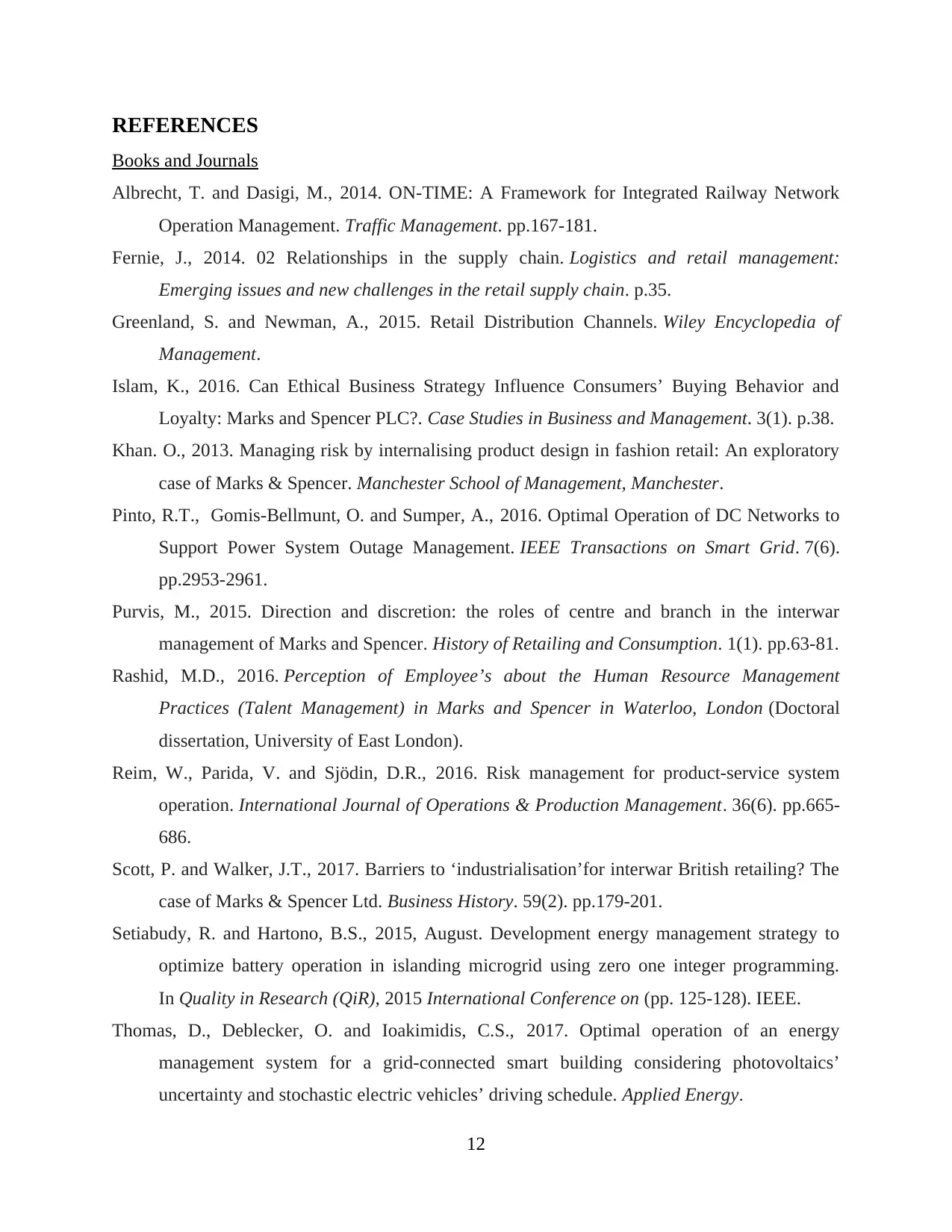
REFERENCES
Books and Journals
Albrecht, T. and Dasigi, M., 2014. ON‐TIME: A Framework for Integrated Railway Network
Operation Management. Traffic Management. pp.167-181.
Fernie, J., 2014. 02 Relationships in the supply chain. Logistics and retail management:
Emerging issues and new challenges in the retail supply chain. p.35.
Greenland, S. and Newman, A., 2015. Retail Distribution Channels. Wiley Encyclopedia of
Management.
Islam, K., 2016. Can Ethical Business Strategy Influence Consumers’ Buying Behavior and
Loyalty: Marks and Spencer PLC?. Case Studies in Business and Management. 3(1). p.38.
Khan. O., 2013. Managing risk by internalising product design in fashion retail: An exploratory
case of Marks & Spencer. Manchester School of Management, Manchester.
Pinto, R.T., Gomis-Bellmunt, O. and Sumper, A., 2016. Optimal Operation of DC Networks to
Support Power System Outage Management. IEEE Transactions on Smart Grid. 7(6).
pp.2953-2961.
Purvis, M., 2015. Direction and discretion: the roles of centre and branch in the interwar
management of Marks and Spencer. History of Retailing and Consumption. 1(1). pp.63-81.
Rashid, M.D., 2016. Perception of Employee’s about the Human Resource Management
Practices (Talent Management) in Marks and Spencer in Waterloo, London (Doctoral
dissertation, University of East London).
Reim, W., Parida, V. and Sjödin, D.R., 2016. Risk management for product-service system
operation. International Journal of Operations & Production Management. 36(6). pp.665-
686.
Scott, P. and Walker, J.T., 2017. Barriers to ‘industrialisation’for interwar British retailing? The
case of Marks & Spencer Ltd. Business History. 59(2). pp.179-201.
Setiabudy, R. and Hartono, B.S., 2015, August. Development energy management strategy to
optimize battery operation in islanding microgrid using zero one integer programming.
In Quality in Research (QiR), 2015 International Conference on (pp. 125-128). IEEE.
Thomas, D., Deblecker, O. and Ioakimidis, C.S., 2017. Optimal operation of an energy
management system for a grid-connected smart building considering photovoltaics’
uncertainty and stochastic electric vehicles’ driving schedule. Applied Energy.
12
Books and Journals
Albrecht, T. and Dasigi, M., 2014. ON‐TIME: A Framework for Integrated Railway Network
Operation Management. Traffic Management. pp.167-181.
Fernie, J., 2014. 02 Relationships in the supply chain. Logistics and retail management:
Emerging issues and new challenges in the retail supply chain. p.35.
Greenland, S. and Newman, A., 2015. Retail Distribution Channels. Wiley Encyclopedia of
Management.
Islam, K., 2016. Can Ethical Business Strategy Influence Consumers’ Buying Behavior and
Loyalty: Marks and Spencer PLC?. Case Studies in Business and Management. 3(1). p.38.
Khan. O., 2013. Managing risk by internalising product design in fashion retail: An exploratory
case of Marks & Spencer. Manchester School of Management, Manchester.
Pinto, R.T., Gomis-Bellmunt, O. and Sumper, A., 2016. Optimal Operation of DC Networks to
Support Power System Outage Management. IEEE Transactions on Smart Grid. 7(6).
pp.2953-2961.
Purvis, M., 2015. Direction and discretion: the roles of centre and branch in the interwar
management of Marks and Spencer. History of Retailing and Consumption. 1(1). pp.63-81.
Rashid, M.D., 2016. Perception of Employee’s about the Human Resource Management
Practices (Talent Management) in Marks and Spencer in Waterloo, London (Doctoral
dissertation, University of East London).
Reim, W., Parida, V. and Sjödin, D.R., 2016. Risk management for product-service system
operation. International Journal of Operations & Production Management. 36(6). pp.665-
686.
Scott, P. and Walker, J.T., 2017. Barriers to ‘industrialisation’for interwar British retailing? The
case of Marks & Spencer Ltd. Business History. 59(2). pp.179-201.
Setiabudy, R. and Hartono, B.S., 2015, August. Development energy management strategy to
optimize battery operation in islanding microgrid using zero one integer programming.
In Quality in Research (QiR), 2015 International Conference on (pp. 125-128). IEEE.
Thomas, D., Deblecker, O. and Ioakimidis, C.S., 2017. Optimal operation of an energy
management system for a grid-connected smart building considering photovoltaics’
uncertainty and stochastic electric vehicles’ driving schedule. Applied Energy.
12
1 out of 14
Related Documents
Your All-in-One AI-Powered Toolkit for Academic Success.
+13062052269
info@desklib.com
Available 24*7 on WhatsApp / Email
![[object Object]](/_next/static/media/star-bottom.7253800d.svg)
Unlock your academic potential
© 2024 | Zucol Services PVT LTD | All rights reserved.





